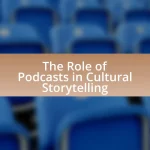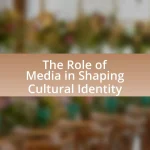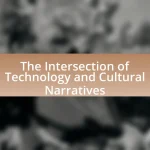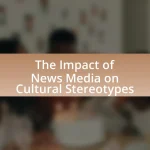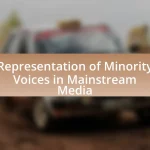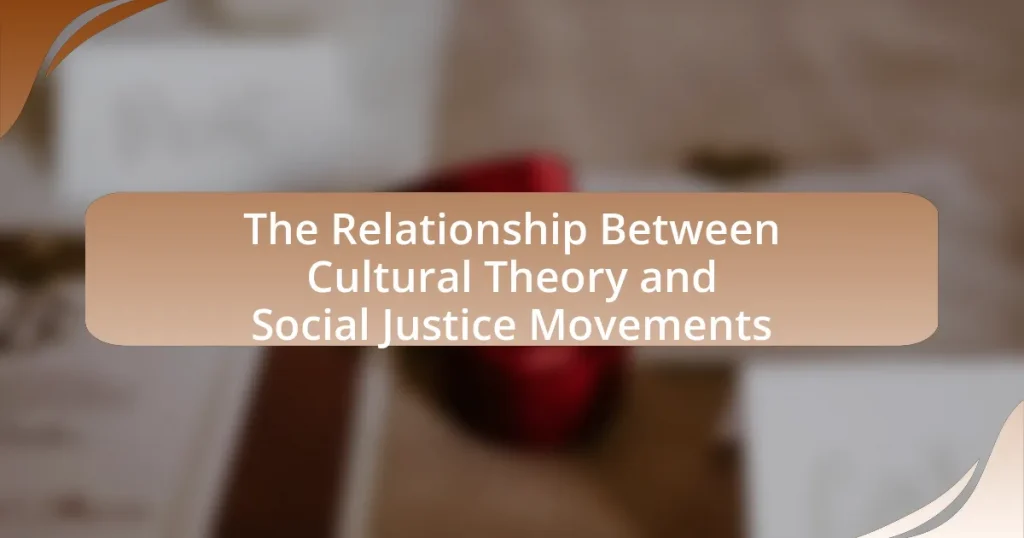The article examines the relationship between cultural theory and social justice movements, highlighting how cultural theory provides essential frameworks for understanding social constructs that contribute to inequalities. It discusses key cultural theories, such as Critical Race Theory and Feminist Theory, and their influence on the goals and strategies of social justice initiatives. The article also explores the historical contexts that have shaped these theories and movements, the role of cultural narratives in activism, and the challenges faced in integrating cultural theory into social justice efforts. Additionally, it outlines practical steps activists can take to leverage cultural theory for enhanced outreach and engagement.
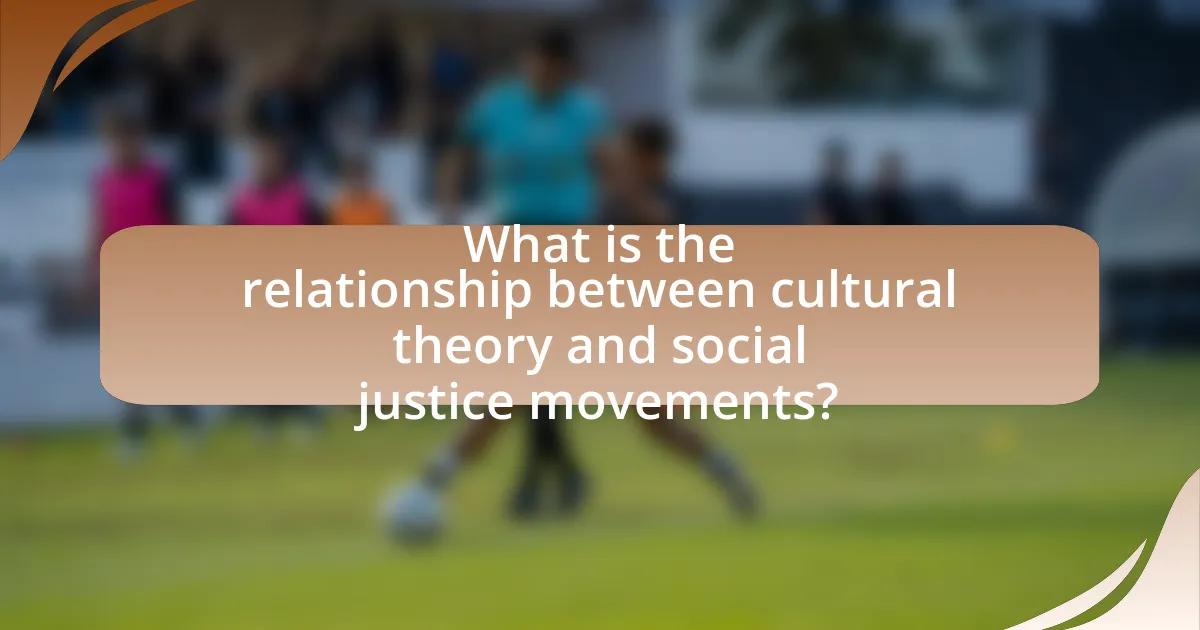
What is the relationship between cultural theory and social justice movements?
Cultural theory and social justice movements are interconnected as cultural theory provides a framework for understanding the social constructs that underpin inequalities. This theoretical perspective analyzes how culture shapes identities, power dynamics, and societal norms, which are often challenged by social justice movements seeking equity and inclusion. For instance, cultural theorists like Stuart Hall have emphasized the role of representation in shaping public perceptions of marginalized groups, which directly informs the strategies employed by social justice activists to combat stereotypes and advocate for systemic change. Thus, cultural theory not only informs the ideologies of social justice movements but also enhances their effectiveness by grounding their goals in a deeper understanding of cultural contexts.
How do cultural theories inform social justice movements?
Cultural theories inform social justice movements by providing frameworks that analyze power dynamics, identity, and representation within society. These theories, such as critical race theory and feminist theory, highlight systemic inequalities and advocate for marginalized voices, thereby shaping the goals and strategies of social justice initiatives. For instance, critical race theory examines how laws and policies perpetuate racial inequalities, which has influenced movements like Black Lives Matter to address police violence and systemic racism. Additionally, feminist theory has propelled gender equality movements by emphasizing the intersectionality of gender with other social categories, leading to more inclusive advocacy efforts. These theoretical foundations enable activists to articulate their demands more effectively and mobilize support for social change.
What are the key cultural theories relevant to social justice?
Key cultural theories relevant to social justice include Critical Race Theory, Feminist Theory, and Postcolonial Theory. Critical Race Theory examines the intersection of race and law, highlighting systemic racism and advocating for legal reforms to achieve racial equity. Feminist Theory critiques gender inequalities and emphasizes the need for gender justice, focusing on the social, political, and economic disparities faced by women. Postcolonial Theory analyzes the impacts of colonialism on cultures and identities, advocating for the recognition and empowerment of marginalized voices in the context of historical injustices. These theories collectively inform social justice movements by providing frameworks for understanding and addressing inequalities.
How do these theories shape the goals of social justice movements?
Cultural theories shape the goals of social justice movements by providing frameworks that define social inequalities and inform strategies for change. For instance, critical race theory emphasizes the role of systemic racism in societal structures, guiding movements to focus on dismantling these systems through policy reform and advocacy. Similarly, feminist theory highlights gender disparities, prompting movements to address issues such as reproductive rights and workplace equality. These theories not only articulate the specific injustices faced by marginalized groups but also inspire collective action and solidarity, as seen in movements like Black Lives Matter and the Women’s March, which are rooted in these theoretical perspectives.
Why is understanding this relationship important?
Understanding the relationship between cultural theory and social justice movements is important because it provides insights into how cultural narratives shape social identities and influence activism. Cultural theory offers frameworks that help analyze the values, beliefs, and practices within societies, which are crucial for understanding the motivations behind social justice movements. For instance, the work of scholars like Stuart Hall emphasizes how cultural representations can either empower or marginalize groups, thereby affecting their capacity to mobilize for justice. This understanding enables activists and policymakers to craft more effective strategies that resonate with diverse communities, ultimately fostering greater social equity.
What impact does cultural theory have on the effectiveness of social justice movements?
Cultural theory significantly influences the effectiveness of social justice movements by shaping the narratives and frameworks through which social issues are understood and addressed. For instance, cultural theory emphasizes the importance of identity, power dynamics, and social context, which can enhance the mobilization of communities and the resonance of messages. Research indicates that movements that effectively incorporate cultural narratives, such as the Civil Rights Movement in the United States, have historically achieved greater visibility and support, leading to tangible policy changes. By framing social justice issues within culturally relevant contexts, movements can foster solidarity and engagement, ultimately increasing their impact and effectiveness.
How can cultural theory enhance the strategies used in social justice advocacy?
Cultural theory can enhance strategies used in social justice advocacy by providing a framework for understanding the diverse cultural contexts and narratives that shape social issues. This understanding allows advocates to tailor their messages and approaches to resonate with specific communities, thereby increasing engagement and effectiveness. For instance, cultural theory emphasizes the importance of identity, power dynamics, and social norms, which can inform strategies that address systemic inequalities. Research by scholars such as Stuart Hall highlights how cultural representations influence public perception and policy, demonstrating that advocacy efforts grounded in cultural theory can lead to more inclusive and impactful outcomes in social justice movements.
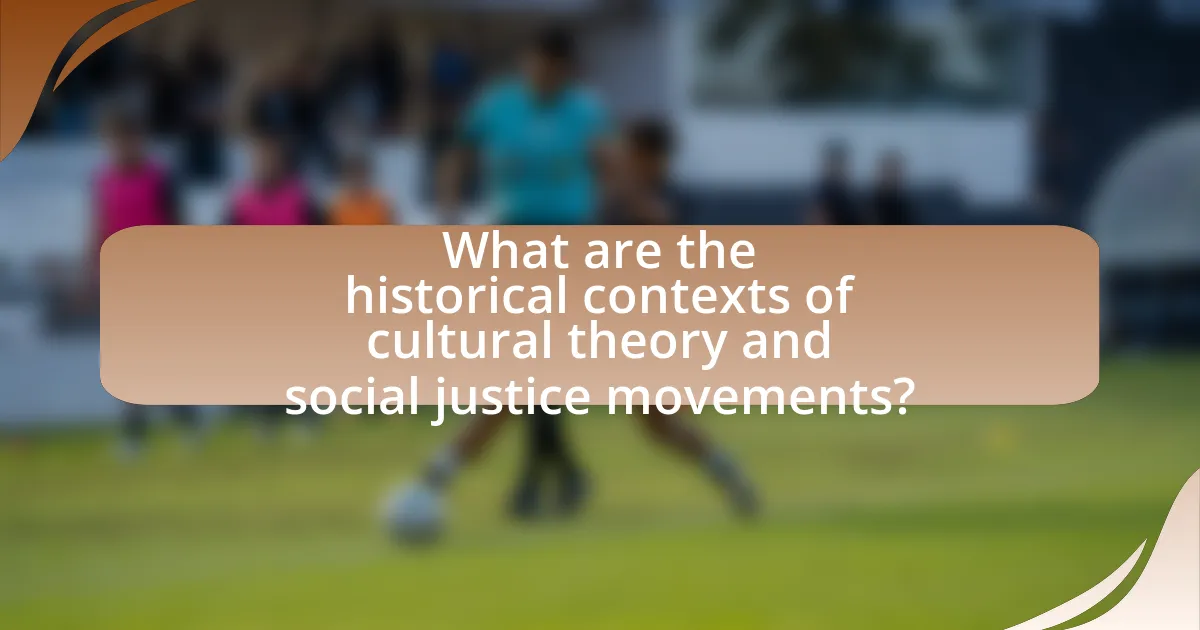
What are the historical contexts of cultural theory and social justice movements?
Cultural theory and social justice movements have historical contexts rooted in the Enlightenment, civil rights struggles, and postmodern critiques. The Enlightenment period, spanning the 17th and 18th centuries, emphasized reason, individualism, and the questioning of traditional authority, laying the groundwork for later social justice movements advocating for equality and human rights. The civil rights movement in the mid-20th century, particularly in the United States, highlighted systemic racism and inequality, influencing cultural theorists to examine power dynamics and representation in society. Additionally, postmodernism, emerging in the late 20th century, challenged grand narratives and emphasized the importance of marginalized voices, further shaping the discourse around social justice. These historical contexts illustrate the interconnected evolution of cultural theory and social justice movements, demonstrating how theoretical frameworks have been informed by and have influenced social activism.
How have cultural theories evolved alongside social justice movements?
Cultural theories have evolved significantly alongside social justice movements by adapting to the changing dynamics of power, identity, and representation. For instance, the rise of critical race theory in the late 20th century emerged in response to civil rights movements, emphasizing the intersection of race and law, which highlighted systemic inequalities. Similarly, feminist theory evolved through the waves of feminism, addressing issues of gender, sexuality, and intersectionality, reflecting the broader societal shifts towards equality and justice. These theories have been informed by activism, with scholars like bell hooks and Kimberlé Crenshaw integrating lived experiences into academic discourse, thereby validating the voices of marginalized communities. This evolution illustrates a reciprocal relationship where cultural theories not only respond to social justice movements but also provide frameworks that empower these movements, reinforcing their goals and strategies.
What historical events have influenced the development of these theories?
The development of cultural theories related to social justice movements has been significantly influenced by events such as the Civil Rights Movement in the United States during the 1950s and 1960s, which highlighted issues of racial inequality and led to the emergence of critical race theory. Additionally, the feminist movements of the late 19th and 20th centuries challenged traditional gender roles and contributed to gender theory, emphasizing the need for social justice in terms of gender equality. The Stonewall Riots of 1969 also played a crucial role in shaping LGBTQ+ rights and theories, marking a pivotal moment in the fight for sexual orientation and gender identity equality. These historical events collectively provided a framework for understanding and addressing systemic injustices, thereby influencing the evolution of cultural theories in relation to social justice.
How have social justice movements adapted cultural theories over time?
Social justice movements have adapted cultural theories over time by integrating concepts such as intersectionality and cultural hegemony to address complex social issues. For instance, the feminist movement incorporated intersectionality, a term coined by Kimberlé Crenshaw in 1989, to highlight how various forms of discrimination overlap, thereby enriching the understanding of gender inequality. Additionally, movements like Black Lives Matter utilize cultural hegemony, as theorized by Antonio Gramsci, to challenge dominant narratives surrounding race and police violence, emphasizing the need for a broader cultural shift. These adaptations demonstrate how social justice movements evolve by applying and reinterpreting cultural theories to better articulate their goals and strategies in response to changing societal contexts.
What role do cultural narratives play in social justice movements?
Cultural narratives play a crucial role in social justice movements by shaping collective identities and mobilizing communities around shared values and experiences. These narratives provide a framework for understanding social injustices, allowing individuals to connect personal experiences with broader societal issues. For instance, the civil rights movement in the United States utilized narratives of equality and justice to galvanize support and articulate the struggles faced by African Americans. Research shows that storytelling within these movements fosters empathy and solidarity, making the issues more relatable and urgent to a wider audience. This connection is evidenced by the success of movements like Black Lives Matter, which employs cultural narratives to highlight systemic racism and police brutality, thereby influencing public perception and policy change.
How do narratives shape public perception of social justice issues?
Narratives significantly shape public perception of social justice issues by framing the context and emotional resonance of these topics. Through storytelling, narratives can highlight injustices, evoke empathy, and mobilize support, influencing how individuals and communities understand and engage with social justice matters. For instance, the narrative surrounding the Black Lives Matter movement has transformed public discourse on racial inequality, leading to increased awareness and policy discussions. Research by the Pew Research Center indicates that 67% of Americans believe that the movement has brought attention to issues of racial inequality, demonstrating the power of narratives in shaping perceptions and driving social change.
What examples illustrate the use of cultural narratives in activism?
Cultural narratives in activism are exemplified by movements such as the Civil Rights Movement, which utilized the narrative of equality and justice to challenge systemic racism in the United States. This movement employed powerful storytelling, including speeches like Martin Luther King Jr.’s “I Have a Dream,” to frame the struggle for civil rights as a moral imperative rooted in American values. Additionally, the LGBTQ+ rights movement has effectively used narratives of love, acceptance, and identity to advocate for equal rights, as seen in campaigns like “It Gets Better,” which aimed to combat bullying and promote understanding. These examples demonstrate how cultural narratives can mobilize communities, shape public perception, and drive social change by resonating with shared values and experiences.
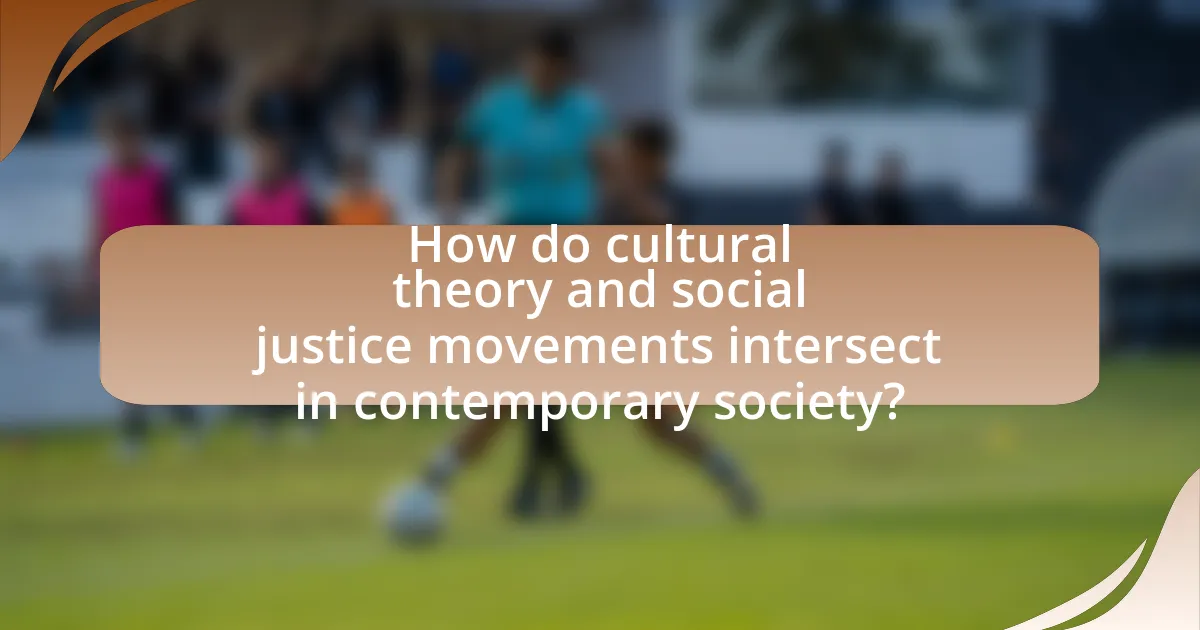
How do cultural theory and social justice movements intersect in contemporary society?
Cultural theory and social justice movements intersect in contemporary society by providing frameworks for understanding power dynamics and advocating for marginalized communities. Cultural theory analyzes how cultural practices and beliefs shape societal structures, while social justice movements utilize these insights to challenge inequalities and promote equity. For instance, the Black Lives Matter movement employs cultural theory to highlight systemic racism and advocate for policy changes, demonstrating the practical application of theoretical concepts in real-world activism. This intersection is evident in academic discourse, where scholars like bell hooks and Stuart Hall have explored the role of culture in social justice, reinforcing the importance of cultural narratives in shaping public consciousness and mobilizing collective action.
What current social justice movements exemplify the application of cultural theory?
Current social justice movements that exemplify the application of cultural theory include the Black Lives Matter movement and the LGBTQ+ rights movement. The Black Lives Matter movement utilizes cultural theory by addressing systemic racism and the cultural narratives surrounding race in America, highlighting how cultural perceptions influence societal structures and individual experiences. Similarly, the LGBTQ+ rights movement applies cultural theory by challenging heteronormative assumptions and advocating for the recognition of diverse sexual orientations and gender identities, thereby reshaping cultural understandings of gender and sexuality. Both movements demonstrate how cultural frameworks can inform activism and drive social change by reshaping societal narratives and addressing power dynamics.
How do movements like Black Lives Matter utilize cultural theory?
Movements like Black Lives Matter utilize cultural theory by framing their activism within the context of cultural narratives and social identities. This approach allows them to challenge systemic racism and promote social justice by highlighting the lived experiences of marginalized communities. For instance, Black Lives Matter employs cultural theory to analyze how cultural representations of race influence public perception and policy, thereby advocating for change through storytelling and collective memory. The movement’s emphasis on intersectionality, as articulated by scholars like Kimberlé Crenshaw, further illustrates how cultural theory informs their strategies, recognizing the interconnectedness of race, gender, and class in shaping social injustices.
What role does intersectionality play in these contemporary movements?
Intersectionality plays a crucial role in contemporary social justice movements by highlighting how various forms of discrimination and privilege intersect and impact individuals differently. This framework allows activists to understand that issues such as race, gender, sexuality, and class do not exist in isolation but are interconnected, influencing people’s experiences and access to resources. For instance, the Black Lives Matter movement incorporates intersectional perspectives by addressing not only police violence against Black individuals but also how this violence disproportionately affects Black women and LGBTQ+ individuals within the community. Research by Kimberlé Crenshaw, who coined the term “intersectionality,” emphasizes that failing to consider these overlapping identities can lead to inadequate responses to social injustices. Thus, intersectionality enriches contemporary movements by fostering a more inclusive approach that recognizes and addresses the complexities of social inequality.
What challenges do social justice movements face in integrating cultural theory?
Social justice movements face significant challenges in integrating cultural theory, primarily due to the complexity and diversity of cultural narratives. These movements often struggle to reconcile varying cultural perspectives, which can lead to fragmentation within their ranks. For instance, cultural theory emphasizes the importance of context and identity, making it difficult for movements to adopt a unified approach that resonates across different cultural backgrounds. Additionally, the theoretical frameworks can be perceived as elitist or disconnected from grassroots activism, creating a barrier to engagement among marginalized communities. This disconnect can hinder the effectiveness of social justice initiatives, as seen in movements that fail to adequately address the specific cultural needs of their constituents.
How can movements overcome resistance to cultural theory in activism?
Movements can overcome resistance to cultural theory in activism by employing inclusive dialogue and education strategies that engage diverse communities. By fostering conversations that highlight the relevance of cultural theory to social justice issues, movements can demystify complex concepts and demonstrate their practical implications. For instance, the Black Lives Matter movement has effectively utilized social media to educate the public on systemic racism, thereby bridging gaps in understanding and garnering broader support. This approach not only counters resistance but also empowers individuals to see the value of cultural theory in addressing real-world problems, as evidenced by increased participation in activism and advocacy efforts.
What strategies can enhance the synergy between cultural theory and social justice efforts?
Integrating cultural theory with social justice efforts can be enhanced through strategies such as interdisciplinary collaboration, community engagement, and critical pedagogy. Interdisciplinary collaboration allows scholars and activists to combine insights from various fields, fostering a more comprehensive understanding of social issues. For instance, the work of cultural theorists like Stuart Hall emphasizes the importance of representation, which can inform social justice campaigns aimed at marginalized communities. Community engagement ensures that the voices of those affected by social injustices are heard and prioritized, as seen in participatory action research that empowers local populations. Critical pedagogy, as advocated by Paulo Freire, promotes critical thinking and reflection, enabling individuals to challenge oppressive structures and advocate for change. These strategies collectively create a robust framework for aligning cultural theory with social justice initiatives, ultimately leading to more effective and inclusive outcomes.
What practical steps can activists take to leverage cultural theory in their movements?
Activists can leverage cultural theory in their movements by integrating cultural narratives into their messaging and strategies. This involves understanding the cultural contexts of their target audiences, which allows activists to craft messages that resonate deeply with those communities. For instance, utilizing storytelling techniques that reflect the lived experiences of marginalized groups can enhance engagement and foster solidarity. Research indicates that movements that effectively incorporate cultural elements, such as art and music, can mobilize support more successfully, as seen in the civil rights movement where cultural expressions played a pivotal role in rallying public support. By aligning their goals with cultural values and symbols, activists can create a more compelling and relatable framework for their initiatives, ultimately driving greater impact and participation.
How can understanding cultural theory improve outreach and engagement?
Understanding cultural theory can significantly enhance outreach and engagement by providing insights into the values, beliefs, and practices of diverse communities. This understanding allows organizations to tailor their communication strategies and initiatives to resonate with specific cultural contexts, thereby fostering trust and connection. For instance, research by Geert Hofstede on cultural dimensions highlights how individualism versus collectivism influences community behavior and engagement levels. By applying these insights, outreach programs can be designed to align with the cultural preferences of target audiences, leading to more effective participation and support for social justice movements.
What resources are available for activists to learn about cultural theory?
Activists can access a variety of resources to learn about cultural theory, including academic texts, online courses, and community workshops. Key academic texts include “Cultural Theory: An Introduction” by Chris Jenks, which provides foundational knowledge, and “The Cultural Studies Reader” edited by Simon During, which compiles essential essays in the field. Online platforms like Coursera and edX offer courses on cultural theory, often taught by university professors, allowing activists to engage with the material at their own pace. Additionally, organizations such as the Cultural Studies Association provide workshops and conferences that facilitate discussions and learning among activists and scholars. These resources collectively enhance understanding of cultural theory’s relevance to social justice movements.

